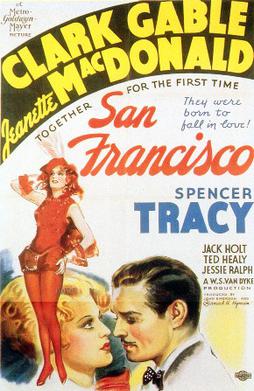
San Francisco is a 1936 American musical-drama disaster film directed by W. S. Van Dyke, based on the April 18, 1906 San Francisco earthquake. The film stars Clark Gable, Jeanette MacDonald and Spencer Tracy. MacDonald's singing helped make this film a major hit, coming on the heels of her other 1936 blockbuster, Rose Marie.
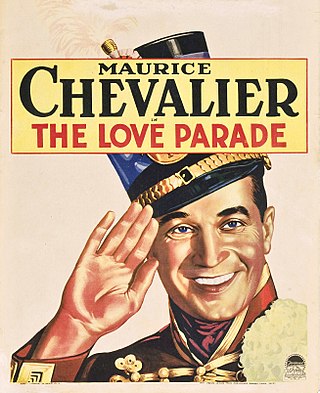
The Love Parade is a 1929 American pre-Code musical comedy film, directed by Ernst Lubitsch and starring Maurice Chevalier and Jeanette MacDonald, involving the marital difficulties of Queen Louise of Sylvania (MacDonald) and her consort, Count Alfred Renard (Chevalier). Despite his love for Louise and his promise to be an obedient husband, Count Alfred finds his role as a figurehead unbearable. The supporting cast features Lupino Lane, Lillian Roth and Eugene Pallette.

Candlestick Park was an outdoor stadium on the West Coast of the United States, located in San Francisco's Hunters Point area. The stadium was originally the home of Major League Baseball's San Francisco Giants, who played there from 1960 until 1999, after which the Giants moved into Pacific Bell Park in 2000. It was also the home field of the San Francisco 49ers of the National Football League from 1971 through 2013. The 49ers moved to Levi's Stadium in Santa Clara for the 2014 season. The last event held at Candlestick was a concert by Paul McCartney in August 2014, and the demolition of the stadium was completed in September 2015. As of 2019, the site is planned to be redeveloped into office space.

Jeanette Anna MacDonald was an American soprano and actress best remembered for her musical films of the 1930s with Maurice Chevalier and Nelson Eddy. During the 1930s and 1940s she starred in 29 feature films, four nominated for Best Picture Oscars, and recorded extensively, earning three gold records. She later appeared in opera, concerts, radio, and television. MacDonald was one of the most influential sopranos of the 20th century, introducing opera to film-going audiences and inspiring a generation of singers.
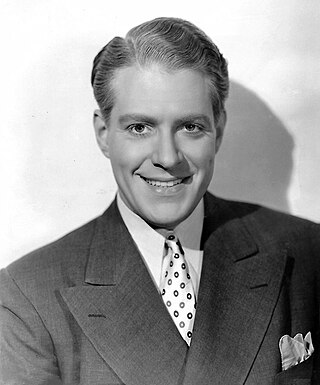
Nelson Ackerman Eddy was an American actor and baritone singer who appeared in 19 musical films during the 1930s and 1940s, as well as in opera and on the concert stage, radio, television, and in nightclubs. A classically trained baritone, he is best remembered for the eight films in which he costarred with soprano Jeanette MacDonald. He was one of the first "crossover" stars, a superstar appealing both to shrieking bobby soxers and opera purists, and in his heyday, he was the highest paid singer in the world.

The 1989 World Series was the championship series of Major League Baseball's (MLB) 1989 season. The 86th edition of the World Series, it was a best-of-seven playoff played between the American League (AL) champion Oakland Athletics and the National League (NL) champion San Francisco Giants. The Series ran from October 14 through October 28, with the Athletics sweeping the Giants in four games. It was the first World Series sweep since 1976, when the Cincinnati Reds swept the New York Yankees.
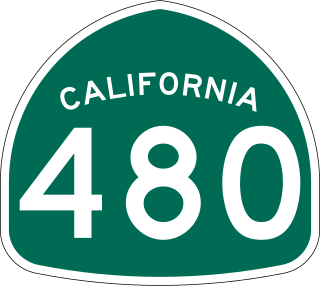
State Route 480 was a state highway in San Francisco, California, United States, consisting of the elevated double-decker Embarcadero Freeway, the partly elevated Doyle Drive approach to the Golden Gate Bridge and the proposed and unbuilt section in between. The unbuilt section from Doyle Drive to Van Ness Avenue was to have been called the Golden Gate Freeway and the Embarcadero Freeway as originally planned would have extended from Van Ness along the north side of Bay Street and then along the Embarcadero to the San Francisco-Oakland Bay Bridge.

"I Left My Heart in San Francisco" is a popular song, best known as the signature song of Tony Bennett. It was written in late-1953 in Brooklyn, New York, with music by George Cory (1920–1978) and lyrics by Douglass Cross (1920–1975).
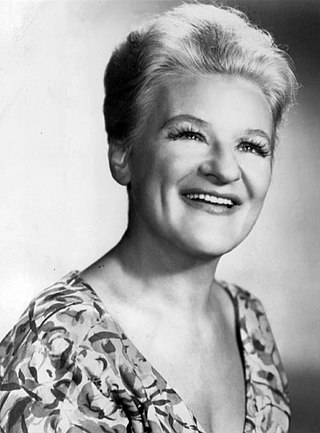
Anna Russell was an English–Canadian singer and comedian. She gave many concerts in which she sang and played comic musical sketches on the piano. Among her best-known works are her concert performances and famous recordings of The Ring of the Nibelungs – a humorous 22-minute synopsis of Richard Wagner's Der Ring des Nibelungen – and her parody How to Write Your Own Gilbert and Sullivan Opera.
"Streets of Laredo", also known as "The Dying Cowboy", is a famous American cowboy ballad in which a dying ranger tells his story to another cowboy. Members of the Western Writers of America chose it as one of the Top 100 Western songs of all time.

"If You Were the Only Girl (In the World)" is a popular song, composed by Nat D. Ayer with lyrics by Clifford Grey. It was written for the musical revue The Bing Boys Are Here, which premièred on 19 April 1916 at the Alhambra Theatre in Leicester Square, London. The song was originally performed as a duet between Lucius Bing, played by George Robey, and his love interest Emma, originated by Violet Loraine.

Maytime is a 1937 American musical and romantic-drama film produced by MGM. It was directed by Robert Z. Leonard, and stars Jeanette MacDonald and Nelson Eddy. The screenplay was rewritten from the book for Sigmund Romberg's 1917 operetta Maytime by Rida Johnson Young, Romberg's librettist; however, only one musical number by Romberg was retained.

"Moonlight Bay" is a popular song. It is commonly referred to as "On Moonlight Bay". The lyrics were written by Edward Madden, the music by Percy Wenrich, and was published in 1912. It is often sung in a barbershop quartet style. Early successful recordings in 1912 were by the American Quartet and by Dolly Connolly.
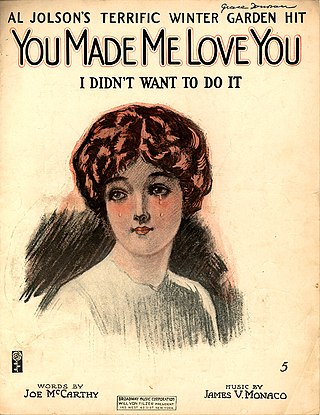
"You Made Me Love You (I Didn't Want to Do It)" is a popular song from 1913 composed by James V. Monaco with lyrics by Joseph McCarthy. It was introduced by Al Jolson in the Broadway revue The Honeymoon Express (1913), and used in the 1973 revival of the musical Irene.
"Climb Ev'ry Mountain" is a show tune from the 1959 Rodgers and Hammerstein musical The Sound of Music. It is sung at the close of the first act and is sung again in the epilogue of the second act by the Mother Abbess. It is themed as an inspirational piece, to encourage people to take every step toward attaining their dreams.
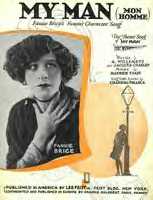
"Mon Homme", also known by its English translation, "My Man", is a popular song first published in 1920. The song was originally composed by Maurice Yvain with French lyrics by Jacques-Charles and Albert Willemetz. The English lyrics were written by Channing Pollock.
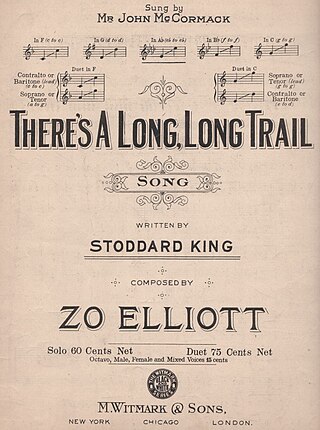
"There's a Long, Long Trail" is a popular song of World War I. The lyrics were by Stoddard King (1889–1933) and the music by Alonzo "Zo" Elliott, both seniors at Yale. It was published in London in 1914, but a December 1913 copyright for the music is claimed by Zo Elliott.
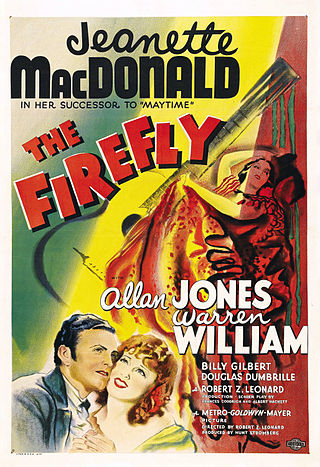
The Firefly is a 1937 American historical musical film directed by Robert Z. Leonard and starring Jeanette MacDonald, Allan Jones and Warren William. The film is an adaptation of the operetta of the same name by composer Rudolf Friml and librettist Otto A. Harbach that premiered on Broadway in 1912. The film used nearly all of the music from the operetta but jettisoned the plot in favor of a new storyline set in Spain during the time of the Emperor Napoleon I. It added a new song, "The Donkey Serenade", which became extremely popular, as was one of the Friml songs, "Giannina Mia". The original release prints of the film were elaborately tinted with Sepia-Blue, Sepia-Orange and Sepia-Blue-Pink.
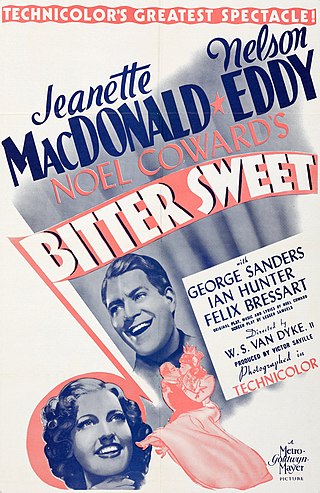
Bitter Sweet is a 1940 American Technicolor musical film directed by W. S. Van Dyke, based on the operetta Bitter Sweet by Noël Coward. It was nominated for two Academy Awards, one for Best Cinematography and the other for Best Art Direction by Cedric Gibbons and John S. Detlie.
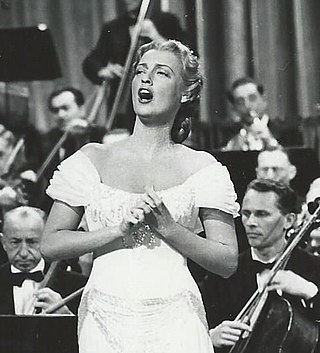
American actress/singer Jeanette MacDonald recorded over 50 songs during her film career for RCA Victor and its foreign counterparts. Due to the limited statistics released to the public, it is not certain how many songs and singles she has released or their exact popularity in music charts, although she has officially recorded eight studio albums and released seven compilation albums. Despite soundtracks for musical films not becoming a concept until the 1940s, many of her singles were re-recordings of songs she had performed in the movies ; her first "album" was the single "Dream Lover"/"March of the Grenadiers" (1930) on 78 rpm discs for The Love Parade. She also recorded a cover album of songs featured in Sigmund Romberg's Up in Central Park in 1945 with Robert Merrill, as well as non-English records during her 1931 European tour.

















